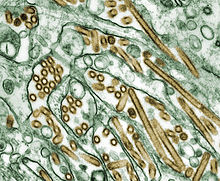Bangladesh reports first human case of H5N1 bird flu
Friday, May 23, 2008
Bangladesh reported its first human case of the H5N1 strain of Avian flu on Thursday. According to a representative of the Bangladesh health ministry, the 16-month old boy initially tested negative for the disease. His virus culture tested positive in tests performed by the United States Centers for Disease Control and Prevention. The boy is from the capital city of Dhaka in the Dhaka District.

Image: Cynthia Goldsmith.
"Although there is no farm in the neighbourhood we suspect that he got the illness after his family bought chickens from a farm," said senior health ministry official Mahmudur Rahman. Rahman is the head of Bangladesh's Institute of Epidemiology and Disease Control and Research. He asserted that the government had the disease under control, and that physicians and hospitals in the country were adequately prepared.
Rahman said Thursday that the child had recovered from the disease. "The child was found infected by H5N1 but after treatment he has recovered and is now doing well," said Rahman in a statement to Reuters.
The World Health Organization (WHO) confirmed the positive test results on Friday. This case in Bangladesh brings the total number of countries in the world with human infections from the disease up to 15. "When a disease is so widespread in poultry, it is really a matter of time before you get a human case. It shows the need to control the disease in animals if you are going to reduce the chances of transmission to humans," said WHO spokesman Gregory Hartl in a statement to Reuters.
| There is no reason to panic. The child contracted the H5N1 bird flu virus in January but we only got confirmation from the CDC on Wednesday it was a human bird flu case. | ||
—Saluddin Khan, Bangladesh government official | ||
The boy had previously been diagnosed with H5N1 in January, but the CDC only confirmed the case this week. In a statement in Agence France-Presse, senior government official Saluddin Khan said: "There is no reason to panic. The child contracted the H5N1 bird flu virus in January but we only got confirmation from the CDC on Wednesday it was a human bird flu case."
Khan commented on preventative measures being taken by the government, saying, "we're destroying the birds and eggs as soon as we have any report of bird flu at any farm in the country."
Bangladesh was first hit by bird flu in February 2007, and after a period of dormancy, was hit again in January 2008. Outbreaks subsided in March when peaking temperatures killed off the virus. Over one million birds were slaughtered during the outbreaks, and at the peak the outbreaks were the cause of a loss 1.5 million jobs in the Bangladesh poultry industry, which is the largest in the world. The Avian influenza has spread through 47 of Bangladesh's 64 districts.
The H5N1 virus seldom infects humans, but according to WHO there have been 382 human cases globally since 2003, including 241 deaths.
Sources
- "WHO confirms first bird flu case in Bangladesh" — Reuters, May 23, 2008
- Julfikar Ali Manik. "Bangladesh: Bird Flu Found in Child" — The New York Times, May 23, 2008
- Mark Dummett. "Bangladesh toddler 'has bird flu'" — BBC News Online, May 22, 2008
- Nizam Ahmed, Masud Karim, Ruma Paul. "Bangladesh says child recovers from bird flu" — Reuters, May 22, 2008
- "Bangladesh reports first human case of bird flu" — Agence France-Presse, May 22, 2008
- "Toddler brings nation into bird flu age" — Melbourne Herald Sun, May 22, 2008
